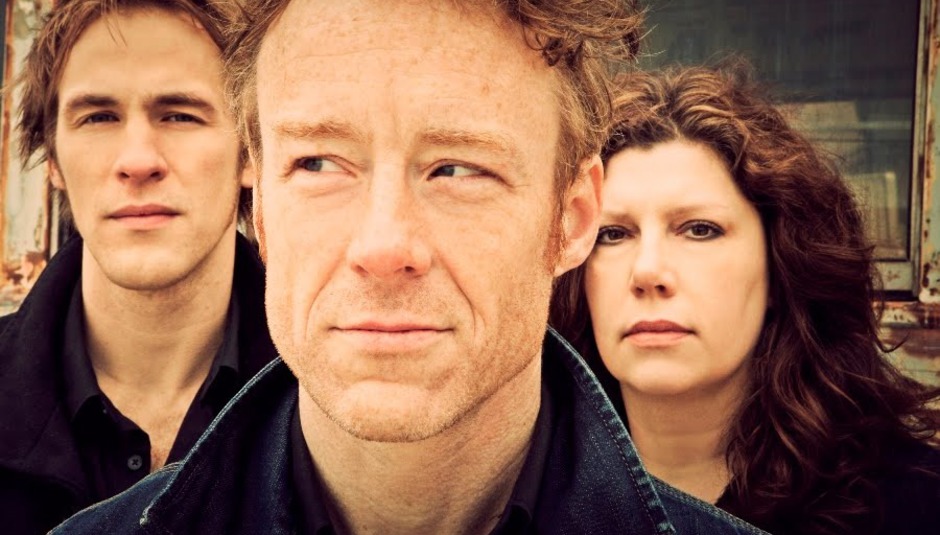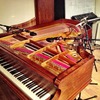Ahead of the release of new album The Invisible Way, Low frontman Alan Sparhawk talks egoless songs, piano hatred and his favourite albums from the band’s 20-year career...
Dan: The thing that hits me most about The Invisible Way is it’s very business-like, there’s no ostentation to the tracks at all. It’s just as though you present these eleven tracks as simply as possible. I read an interview where you talked about the recording process, how you didn’t have much time and did it as simply as possible. I wondered whether that was a deliberate aesthetic decision or whether it was something that you were forced into?
Alan: I don’t know... from the beginning we’ve worked on a budget. Often, it just means trying to be as concise as you can with the time. I don’t know... we were able to spend the time we needed to get things done. We had done a lot of preparing, done our homework, demoed all the songs, and we’d narrowed things down, we knew exactly which tunes we were going to do. You can waste time working on songs that don’t end up being on the record. I guess, since we only had so much time, we tried to be as focused as possible. Yeah... the simplicity and minimalism of it were definitely preconceived, so to speak. I had had a few conversations with Jeff [Tweedy, who produced the album] and talked to him about how we wanted to keep it simple. I sent him some demos, and he really liked the demos and the way things were going there, so that’s what we started with. The demos were fairly simple. I think we definitely had enough time to do what we needed to do. It just seems really concise this time. There wasn’t any extra things or wasted time, you know?
Dan: For me, it’s quite refreshing, it’s unburdened by weighty ostentation. It’s quite a light listen, compared to some of the other stuff, perhaps?
Alan: Yeah, simpler arrangements, perhaps focusing on songs. I’ve had this thing about ego-less songs lately. I guess that’s my name for them, but basically songs that stand on their own, that don’t feel like they depend on who’s singing them, if you know what I mean? We’ve always been like, “this is Low, this is how we do things,” and a lot of our material depends on us playing it as well for it to really be what it is. I’ve kind of got this thing for... I don’t know if it’s because of Robert Plant covering those songs [‘Monkey’ and ‘Silver Rider’ – Plant was nominated for a Grammy for the latter], but I’ve been into the idea of writing songs that don’t need me! Songs that just, on their own, stand. There’s a couple of places where we indulged a little bit, stretched out, but for the most part I like keeping to the tunes and see where it takes us. I don’t know that that will always be where we’re at, but for this record, I think especially working with Jeff, another songwriter/singer kind of thing, I guess it’s just where the mindset was. We were just trying to be true to the tunes.
Dan: Can you ever imagine a time when you are exclusively a songwriter? Will you ever withdraw from performing entirely?
Alan: I don’t know. It might be interesting, but I’m kind of addicted to the stage and that interaction, sort of an admitted... I definitely need approval! I feel like that’s probably the most pure form, essentially when someone shows up unsolicited to come and hear the tunes, rather than sitting someone down and forcing them to listen to something. I don’t know, yeah... I kind of always want to be playing. I love the tension of the interaction that happens onstage with an audience and the moment. I guess I push it even more by having other people that I play with from time to time, so yeah, I don’t know. Sometimes I think about that. After 20 years, you start wondering, what does this mature into? Are we still going to be playing CBGB-style clubs for the rest of our lives? It may be interesting. It’s certainly flattering to have someone else do your tunes and stuff. But I don’t know... sometimes when you’re writing a song, there’s sort of a quality control and a strength that you draw from knowing that it’s something that you’re going to later sing in front of people, and to me, sometimes that’s a big factor in how it’s written and how the song ends up coming together.
Dan: When I spoke to you a couple of years ago, you said that these days it’s hard to make money from records, that it’s from touring that you make the money.
Alan: Right.
Dan: I was going to ask you whether that puts less importance on the recording process and the album-making process, and more emphasis on playing live? It sounds like you enjoy playing live the most?
Alan: Yeah, but I don’t know, making good records, that’s the eternal part of it. Playing a show, it’s more the moment, that day, that space, those people that are there in the same room, you know? No, I still love making records. It’s definitely still an important thing. I guess since we’ve always been a touring and live band, it’s always part of the equation as far as what we’re doing and even how we make records and whatnot.
Dan: You’ve been really productive over 20 years – this is album number ten, plus you’ve got all manner of EPs and mini-albums.
Alan: Yeah, it gets to build up after a while. It’s surprising.
Dan: When we spoke last time, you talked about the secret of your longevity, which you felt was the fact that you keep putting yourself in unusual situations, breaking out of your comfort zone.
Alan: Yeah.
Dan: I wondered whether that was part of your thinking, working with Jeff Tweedy?
Alan: Well, we knew him a little bit from playing some shows, and he’s friendly. I’d gone jogging a few times in the woods, and you get to know a person pretty quickly sometimes without really having to talk too much that way. So there’s a bit of a trust there, but at the same time it was sort of a mystery, you know? It was kind of a wild card, “Wow, what’s he going to do? What are we going to sound like bounced off of him?” I think to me that was sort of the unknown. We had visited the studio. When we initially decided to record with him, it was because we had visited the studio and saw the place and sort of got really... I was impressed with the feel there and the vibe. It was just kind of a comfortable atmosphere, he had a really good engineer that he’s been working with, so that was sort of the last straw. Ever since we’d written the music, he was sort of in the back of our mind as a possibility, to see about recording there. Yeah, this time it was actually going there and hearing what he could do that decided it. Yeah, I think one of the other challenges this time was the piano, you know? That was definitely a love/hate thing with the piano. As we were writing, especially as Mim [Parker] was writing, it was evident that the piano was, despite my squirms, going to end up being one of the main instruments, so I guess at that point it was, “well, dive into it and commit to it.”
Dan: What’s wrong with the piano? Is it a personal preference, or...?
Alan: I guess the general quest for finding something new, the quest of, while still being minimalist, still finding a way to take simple things and make it new. The piano is probably the most... It’s got a lot of baggage! It’s obviously been used in music for hundreds of years, it’s been the classic go-to for rock or pop music when it wants to embellish things, give it a little support or class or a little candy to it. It’s used in many ways to kind of bolster things in a certain way. I’ve always been sceptical of that. Plus, real men don’t play the piano! Guitars, dude, you know?! It really took me a bit to be able to commit to it, but once we did... A lot of it had to do with Steve [Garrington], our bass player, who’s a really good musician, and as we were writing songs, he really took the bull by the horns, he’d go home and work on parts and work on stuff and bring it back and run it past me, basically understanding it’s like, “OK, if we’re going to have the piano here, it needs to have real purpose, it’s not going to be just candy, it’s not going to just embellish or give false depth to something that we’re not confident with, or something like that. If we’re going to do this, it’s got to be at least vital, and at the very best, maybe somewhat original. If we could find a way to use it to give it real purpose and in the same way use it slightly, maybe, off from what it’s normally used for…” Yeah, I’m just kind of sceptical. At the same time, for many years I had the same feeling about acoustic guitars, always been sceptical of the clichés and typical, “throw an acoustic guitar on there and warm it up.”
I don’t know, I don’t like the cheap go-tos. It’s something that I think just gets used without thought necessarily. I think subconsciously it’s because everybody’s been hearing that instrument for years and years, so when it gets inserted into something you’re doing, it’s like, “oh, yes, it’s great!” It’s like, no, it’s not great, it’s just familiar. It gives you reassurance, or it gives you false security, because basically you’re counting on the history of the instrument instead of what it’s actually doing. So I don’t know, it was kind of a challenge. Plus at the same time, we were about to work with Jeff Tweedy, who is kind of a cornerstone for the sort of Americana/roots-crossed-with-moving-forward kind of music in America. For a lot of the same reasons I’m sceptical of those instruments, I’m sceptical of having one foot too far in the past and using these old elements to kind of empower your own material. So I don’t know, yeah, it was a gamble. I remember feeling it was kind of a gamble, “OK, this could go either really well, because it’s us, it’s always going to sound like us, or it could get really weird and go down that direction.” I don’t know, there was part of me… I guess it gets back to having spent some time with him, there was part of me that knew he, in certain ways, understood what we were doing and trusted what we were doing, and I guess in a certain way that creates the trust with him. That was vital, being able to trust him, I thought that was the last 5% that we needed to make the record, so yeah, I was really pleased, actually, that, number one, he recognised and respected what we were bringing, and really just helped us arrive at what we were trying to get, he helped us to our own parameters sometimes. You start second-guessing yourself sometimes and thinking, pull out some old habits to keep yourself secure, but he was good about reminding us what our original goal was and making the hard decisions... No, helping us, “That sounds great, but is it necessary?,” as we were adding things. For the most part, it’s sort of an aesthetic that’s always been with Low, but it’s always hard to keep to your own rules!
Dan: I was wondering about the song ‘Plastic Cup’, about the final line, “Maybe you should go out and write your own damn song” – who is that directed to, journalists and critics?
Alan: Yeah, it’s a loosener a little bit. It’s a little... That song kind of takes this journey of the now and looks into the future, and sort of the future and how it looks back, there’s a little bit of time travel there, and at the end, I don’t know, in many ways that line is sort of stepping out of the song and talking to the observer and saying... Yeah, it’s almost like an aside or something in a play or a movie where things are moving along and suddenly one of the characters turns to the audience and starts talking to them, or something. There’s this reality shift that I think sometimes... I think the song fell as it fell and came together as it came together, but I remember as I was finishing it and getting that together, that’s how it felt to me, popping my head up during the process and saying, ”what do you think of this? Oh, yeah? Well, why don’t you go do... If you don’t understand it or if you don’t like it or if you don’t agree or follow this line of thinking, then why don’t you go try to say something? It’s not easy, you know!” It’s a little bit of that, it’s a little bit of cynicism, it’s a little bit of... I don’t know, to me it’s meant in the highest respect! It’s more just turning it a little bit on end and making people think about their own role in what has just happened to them.
Dan: I really want to know, after a 20-year career, if there’s any one particular song or one particular album that you’re most proud of?
Alan: Oh, of ours? Well, I’m pretty proud of everything, I’m not really one to look back and say, “Oh, yeah, this record sucks,” and, “I would have done that differently.” Those are the decisions we made at the time and the best decisions we could. We’ve always been pretty good at just respecting who we were at one time and not sort of abandoning that. Maybe it’s kind of cheesy, but the ‘Christmas’ record on many levels is memorable and a favourite, because it was something that came together unexpectedly. When we did it, it was a very casual thing, we thought a few fans would enjoy it, and it ended up being almost an arrival for us in many places, especially the UK. John Peel, he’d been playing us before, but when that record came out he really jumped on it and brought it to the daytime guys and said, “You guys should be playing this during the day,” and they did, and in many ways it was sort of... If we ever had a big boost in the UK, it was that record. I don’t know, it’s probably the only one we ever really listen to! We’ll take it out with us a few times and the kids enjoy it, and there’s always something on it that I hear that I smile about. I don’t know if it’s necessarily pride, but you look back and you go, “wow, I’m really surprised this thing still lights me up.” Other than that, I don’t know, I guess things stick out. Drums And Guns, as messed up as I was, perhaps, at that time, I really thought it was a brave piece and a timeless thing. I don’t know, I think down the line, if anybody cares years from now, I feel like I can point at that one and recognise that it was definitely a pretty original piece of music. We were definitely taking a lot more chances and going out of our comfort zone much more than we ever have. I was happy with the results. It’s not the most concise tunes and arrangements, but I really felt like, despite ourselves, it depicted exactly what I think needed to be said at the time.
Dan: Talking about the Christmas album, one of our readers asked me to ask you if there’s any chance of you playing it live at some point – well, at Christmas, I’d imagine? Would you ever?
Alan: There’s whisperings of some special things maybe later this year, towards December, that we might be doing, and I think it’ll probably come up. Yeah, since it came out there’ve been a few times where we’ve come over and done specifically Christmas things, but yeah, I think this coming year is... According to some of the plans that are brewing right now, I think it’s highly likely that we’ll probably be over and reference that record, for sure.
The Invisible Way is out on 18th March 2013 on Sub Pop.
Check back soon for DiS' live session with Low.
You can catch the band on tour on the following dates:
24 April - Birmingham, Glee Club
25 April - Manchester, Central Methodist Hall
26 April - Gateshead, The Sage Gateshead
27 April - Glasgow, Classic Grand
29 April - Bristol, Trinity
30 April - London, Barbican Centre






















